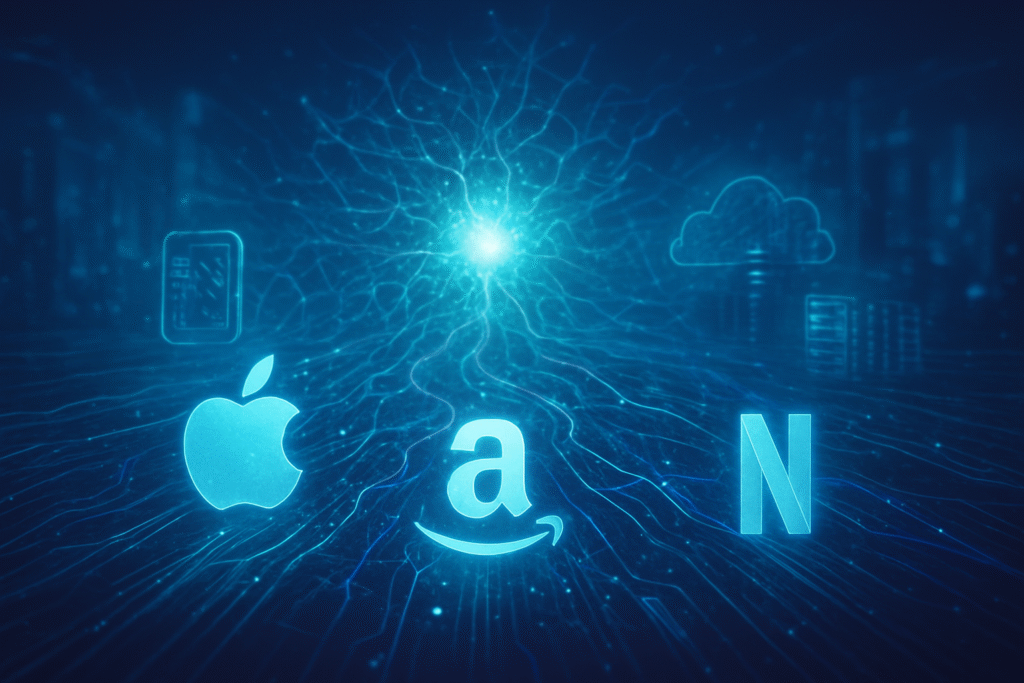
As of late October 2025, the tech industry continues to be a powerful engine for market rallies, with giants like Apple (NASDAQ: AAPL) and Amazon (NASDAQ: AMZN) at the forefront, demonstrating sustained growth and influence. Despite earlier market jitters over escalating AI infrastructure spending, robust earnings reports and strategic advancements in artificial intelligence have reignited investor confidence, pushing these companies to new heights. This resurgence is not merely a reflection of market sentiment but a testament to profound underlying technological innovations, with AI serving as the primary catalyst for their continued expansion and competitive edge.
Apple, fresh off a strong fiscal Q4 2025, saw its market capitalization briefly eclipse the $4 trillion mark, propelled by record services revenue and the anticipation surrounding its privacy-centric AI initiatives like Apple Intelligence. Similarly, Amazon's impressive Q3 2025 results, driven by the explosive growth of Amazon Web Services (AWS) and significant investments in custom AI chips and infrastructure, sent its stock soaring. Meanwhile, Netflix (NASDAQ: NFLX) is quietly but effectively integrating generative AI into its content production and advertising strategies, signaling a broader industry shift towards AI-powered operational enhancements and new viewer experiences, even amidst a slight dip in its stock after a tax-related earnings miss. These developments underscore a pivotal moment where technological leadership, particularly in AI, directly translates into market dominance and sets the stage for the next era of digital transformation.
Underlying Technological Innovations and AI Paradigms
The recent market dynamism is deeply rooted in the distinct and ambitious technological advancements spearheaded by these tech titans, particularly in the realm of artificial intelligence. Each company is carving out its unique niche, pushing the boundaries of what AI can achieve, from on-device privacy-centric intelligence to expansive cloud-based AI infrastructure and generative AI-powered content creation.
Apple's (NASDAQ: AAPL) strategy revolves around deeply embedding AI into its ecosystem with Apple Intelligence, a suite of generative AI models designed for iOS 18, iPadOS 18, and macOS Sequoia. This approach prioritizes privacy and on-device processing, leveraging its custom Apple Silicon chips and Neural Engine to perform complex machine learning tasks locally. This allows for features like custom-generated emojis, advanced photo editing, sophisticated writing assistance, and a more contextually aware Siri—a fully AI-powered version of which is anticipated in 2026. A significant departure from its historically closed ecosystem, Apple is also embracing a multi-model strategy, integrating third-party AI models like OpenAI's ChatGPT, with rumored discussions underway for Google's Gemini, Anthropic, and Perplexity. This shift distinguishes Apple by offering a hybrid AI experience that combines the best of on-device privacy with the power of leading cloud-based models, directly addressing the capabilities of competitors while maintaining its core privacy principles.
Amazon (NASDAQ: AMZN), through its powerhouse Amazon Web Services (AWS), is positioning itself as the foundational layer for enterprise AI. Its strategy is characterized by aggressive investment in custom AI hardware and a comprehensive suite of cloud-based machine learning services. AWS Bedrock has expanded significantly, now offering access to a broader array of foundation models from partners like OpenAI, DeepSeek, and Anthropic, alongside its own proprietary models. Crucially, Amazon's commitment to custom AI silicon is evident with the strong adoption of its Trainium2 chips, which have become a multi-billion-dollar business, experiencing 150% quarter-over-quarter growth. The company further solidified its infrastructure leadership with Project Rainier, a massive AI compute cluster featuring nearly 500,000 Trainium2 chips dedicated to training Anthropic's Claude AI models, and the introduction of new Amazon EC2 P6e-GB200 UltraServers utilizing NVIDIA Grace Blackwell Superchips. This focus on scalable, high-performance, and cost-efficient AI infrastructure via AWS, coupled with internal AI tools like "Quick Suite" and "Transform" for employee productivity, sets Amazon apart as a key enabler of the global AI revolution.
Netflix (NASDAQ: NFLX) is demonstrating a practical and impactful application of generative AI directly within its core business: content creation and viewer experience. While AI has long powered its recommendation engine, the streaming giant is now integrating generative AI into its production pipeline. A notable example is the Argentine sci-fi series "El Eternauta," which utilized AI for visual effects, reportedly achieving results ten times faster and at a lower cost than traditional methods for scenes like a collapsing building. This move showcases a shift from purely analytical AI to creative AI, enhancing production workflows rather than replacing human creativity. Furthermore, Netflix is deploying generative AI in its advertising systems, preparing to launch interactive, AI-driven ads in the latter half of 2025 that dynamically adjust to viewer interests. The company has also rolled out new conversational AI experiences for title search, further refining content discovery. These advancements highlight Netflix's pragmatic approach to leveraging AI for operational efficiency, innovative content delivery, and enhanced monetization, demonstrating a tangible return on AI investment in a highly competitive entertainment landscape.
Initial reactions from the AI research community and industry experts have largely lauded these strategic moves. Apple's multi-model AI integration is seen as a pragmatic acknowledgment of the diverse strengths of different AI systems, while its on-device approach is praised for advancing privacy in generative AI. Amazon's relentless pursuit of custom silicon and massive compute clusters through AWS is viewed as critical for scaling the next generation of AI models and democratizing access for enterprises. Netflix's direct application of generative AI in content production is considered a significant step towards industrializing creative AI, offering a glimpse into the future of media production where AI tools augment human artistry and efficiency.
Competitive Landscape and Corporate Impact
The aggressive AI advancements by Apple (NASDAQ: AAPL), Amazon (NASDAQ: AMZN), and Netflix (NASDAQ: NFLX) are reshaping the competitive landscape across multiple industries, creating both immense opportunities and significant challenges for established tech giants, emerging AI labs, and startups alike. These developments solidify the market leaders' positions while simultaneously fostering an environment ripe for strategic partnerships and potential disruptions.
Apple's foray into on-device AI with Apple Intelligence, coupled with its willingness to integrate third-party models, presents a dual impact. For Apple, it enhances the value proposition of its entire hardware and software ecosystem, driving both device sales and its burgeoning services revenue—a division that saw 15% growth in its latest fiscal quarter. This strategy also helps Apple directly compete with Google (NASDAQ: GOOGL) and Microsoft (NASDAQ: MSFT) in the generative AI space, where it had previously lagged. For leading AI labs like OpenAI, Anthropic, and potentially Google (with Gemini), securing integration into Apple's vast user base represents a massive distribution channel and validation of their models, opening up new revenue streams and accelerating their reach. However, this also intensifies competition among these AI model providers to secure prime positioning within Apple's ecosystem, potentially leading to a "winner-take-most" scenario for specific use cases. Startups focusing solely on cloud-based AI solutions might find it harder to compete with Apple's privacy-first, on-device processing unless they offer truly differentiated capabilities.
Amazon's strategic focus on AI infrastructure through AWS has profound implications for the entire tech industry. By offering custom AI chips like Trainium2 and massive compute clusters such as Project Rainier, Amazon is not just participating in the AI race; it's building the very tracks on which the race is run. This benefits not only Amazon by cementing AWS's dominance in cloud computing and attracting top-tier AI developers, but also a myriad of AI startups and enterprises that rely on AWS for their computational needs. The strong adoption of Trainium2 and the launch of new NVIDIA Grace Blackwell Superchip-powered UltraServers underscore Amazon's commitment to providing cutting-edge, scalable AI compute. This competitive advantage in infrastructure could disrupt traditional hardware manufacturers and smaller cloud providers, making it difficult for them to match Amazon's scale and cost efficiencies. Furthermore, Amazon's substantial investment in Anthropic, yielding a $9.5 billion pre-tax gain, positions it as a key player in the development and deployment of leading-edge foundation models, potentially giving AWS customers early or preferential access to advanced AI capabilities.
Netflix's integration of generative AI into content production and advertising signals a significant shift in the entertainment industry. For Netflix, these innovations promise efficiency gains in content creation, potentially leading to faster production cycles and cost savings, as demonstrated by "El Eternauta." The introduction of interactive, AI-driven ads could unlock new monetization avenues and enhance advertiser appeal, directly impacting its revenue growth. This move puts pressure on traditional studios and other streaming services to adopt similar AI-powered workflows to remain competitive in content volume, quality, and cost-effectiveness. While AI is augmenting human creativity rather than replacing it, this development could lead to a restructuring of roles within Hollywood, with new demands for AI-savvy creatives and technicians. For AI startups specializing in creative tools or advertising technology, Netflix's adoption creates a massive market opportunity, but also necessitates robust, ethically sound, and scalable solutions that can integrate seamlessly into large-scale production environments.
Broader AI Landscape and Societal Implications
The current wave of AI integration by tech giants like Apple, Amazon, and Netflix transcends mere product updates; it signifies a profound shift in the broader AI landscape, marking a new era of practical, pervasive, and economically impactful artificial intelligence. This moment can be likened to previous technological inflection points, such as the advent of the internet or mobile computing, as AI moves from a specialized domain to a fundamental driver of innovation across diverse sectors, from consumer electronics to cloud infrastructure and creative industries.
These developments underscore several key trends in the AI world. Firstly, the emphasis on hybrid AI deployments is growing, as exemplified by Apple's blend of on-device privacy-preserving AI with selective cloud-based models. This reflects an industry-wide effort to balance performance, scalability, and data privacy. Secondly, the democratization of advanced AI capabilities through cloud platforms like AWS Bedrock, coupled with specialized hardware, is accelerating. Amazon's massive investments in custom AI chips and compute clusters make cutting-edge AI accessible to a wider range of enterprises and startups, lowering the barrier to entry for developing and deploying sophisticated AI solutions. Thirdly, the practical application of generative AI in creative fields is becoming a reality, with Netflix leading the charge in content production and advertising. This moves AI beyond analytical tasks into generative roles, augmenting human creativity and opening new avenues for efficiency and innovation in media.
However, this rapid advancement is not without its potential concerns. The escalating capital expenditure by Big Tech on AI infrastructure, while fueling market rallies, also raises questions about the concentration of AI power and resources within a few dominant players. This could create a widening gap between tech giants and smaller entities, potentially stifling competition and innovation in the long run. Ethical considerations surrounding the use of generative AI in content creation, including issues of intellectual property and potential job displacement in creative industries, remain paramount. While Netflix has established guidelines for responsible AI use, the broader industry will need robust frameworks to address these challenges. Furthermore, the sheer scale of data processing required for these AI systems continues to raise privacy concerns, even with efforts like Apple's on-device processing, highlighting an ongoing tension between AI utility and user data protection.
Compared to previous AI milestones, such as the initial breakthroughs in machine learning for pattern recognition or the rise of deep learning for image and speech recognition, the current phase is characterized by generative AI's ability to create novel content and its direct integration into core business operations. Past AI innovations often served as backend enhancements; today, AI is becoming a front-facing, interactive, and transformative force. The collective efforts of Apple, Amazon, and Netflix illustrate a maturation of AI technology, where theoretical capabilities are now being translated into tangible products, services, and operational efficiencies that directly impact financial performance and consumer experience on a global scale. This marks a significant leap from specialized AI applications to pervasive, ecosystem-wide intelligence.
The Road Ahead: Future Developments and Challenges
Looking ahead, the trajectory set by Apple, Amazon, and Netflix points towards a future where AI becomes even more deeply embedded in every facet of technology, from personal devices to global cloud infrastructure and creative industries. The near-term promises a rapid evolution of existing AI capabilities, while the long-term forecasts revolutionary shifts in how we interact with technology and consume content.
For Apple (NASDAQ: AAPL), the immediate future will see the maturation of Apple Intelligence, with a more advanced, personalized, and contextually aware Siri expected in 2026. The integration of additional third-party AI models beyond OpenAI, potentially including Google's Gemini, Anthropic, and Perplexity, will broaden the capabilities of its ecosystem, offering users unparalleled choice and flexibility. We can anticipate deeper AI integration within augmented reality (AR) experiences, particularly with advancements in the Vision Pro and future iPhone models, creating seamless blend of digital and physical worlds. Amazon (NASDAQ: AMZN) will continue its aggressive expansion of AWS AI services, with further iterations of custom AI chips like Trainium and the deployment of even larger compute clusters to meet the insatiable demand for AI training and inference. The focus will be on making secure, scalable AI agents via AWS Bedrock AgentCore more accessible for enterprises, alongside continued internal AI optimization through tools like "Quick Suite." Netflix (NASDAQ: NFLX) is poised to launch interactive, AI-driven ads in the latter half of 2025, promising a new frontier in personalized advertising. Expect generative AI to become even more pervasive in content production, not just for visual effects but potentially for script development, character design, and even dynamic content adaptation, pushing the boundaries of storytelling.
However, this accelerated pace of innovation also brings significant challenges. The escalating cost of AI development and deployment, particularly the capital expenditure on advanced hardware, remains a critical concern, potentially widening the gap between tech behemoths and smaller players. Ethical considerations around generative AI—ensuring content integrity, preventing misuse, and navigating complex intellectual property rights—will demand robust solutions and industry-wide standards. While companies like Netflix are proactively developing internal guidelines, regulatory bodies will likely play an increasing role in shaping the ethical landscape of AI. Furthermore, the imperative to balance powerful AI capabilities with user privacy will intensify, requiring continuous innovation in areas like federated learning and secure multi-party computation. Experts predict a continued convergence of hardware and software, the emergence of more sophisticated multimodal AI, and the development of truly autonomous AI agents that can perform complex tasks with minimal human oversight. The next few years will be defined by how these tech giants navigate these opportunities and challenges, setting the precedent for the responsible and impactful deployment of artificial intelligence globally.
Conclusion: A New Era of AI-Driven Growth
The current market rally, substantially driven by the technological prowess of Apple, Amazon, and Netflix, marks a pivotal moment in the history of artificial intelligence. The key takeaway is clear: AI has moved beyond a theoretical or niche application to become the central engine for innovation, operational efficiency, and market value creation for the world's leading tech companies. Their distinct yet equally impactful approaches—Apple's privacy-centric on-device intelligence, Amazon's foundational cloud AI infrastructure, and Netflix's creative generative AI applications—collectively illustrate a mature and multifaceted AI ecosystem that is transforming industries from the ground up.
This period stands as a significant milestone in AI history, demonstrating the technology's readiness for widespread commercial adoption and its capacity to directly influence financial markets and consumer experiences. Unlike earlier phases where AI was often an invisible backend process, we are now witnessing AI as a front-and-center feature, enabling new product capabilities, streamlining complex operations, and even generating creative content. The long-term impact will likely see AI becoming an indispensable layer across all digital interactions and services, fundamentally redefining user interfaces, business models, and creative workflows. The strategic investments and innovations by these tech titans are not merely incremental improvements but foundational shifts that will shape the competitive landscape for decades to come.
In the coming weeks and months, industry observers should closely watch several key indicators. For Apple (NASDAQ: AAPL), the performance and user adoption of Apple Intelligence, particularly its multi-model integration strategy, will reveal how successfully it can leverage AI to further differentiate its ecosystem and drive services revenue. For Amazon (NASDAQ: AMZN), continued growth in AWS AI services and the expansion of its custom AI chip ecosystem will be crucial metrics for its leadership in foundational AI infrastructure. Netflix (NASDAQ: NFLX) will offer insights into the commercial viability and creative impact of generative AI in media production, especially with the rollout of interactive, AI-driven advertising. Beyond these individual companies, the broader implications—including the ongoing debate around AI ethics, the development of regulatory frameworks, and the potential for AI to foster both unprecedented growth and societal challenges—will remain critical areas of focus as the AI revolution continues to unfold.
This content is intended for informational purposes only and represents analysis of current AI developments.
TokenRing AI delivers enterprise-grade solutions for multi-agent AI workflow orchestration, AI-powered development tools, and seamless remote collaboration platforms.
For more information, visit https://www.tokenring.ai/.






